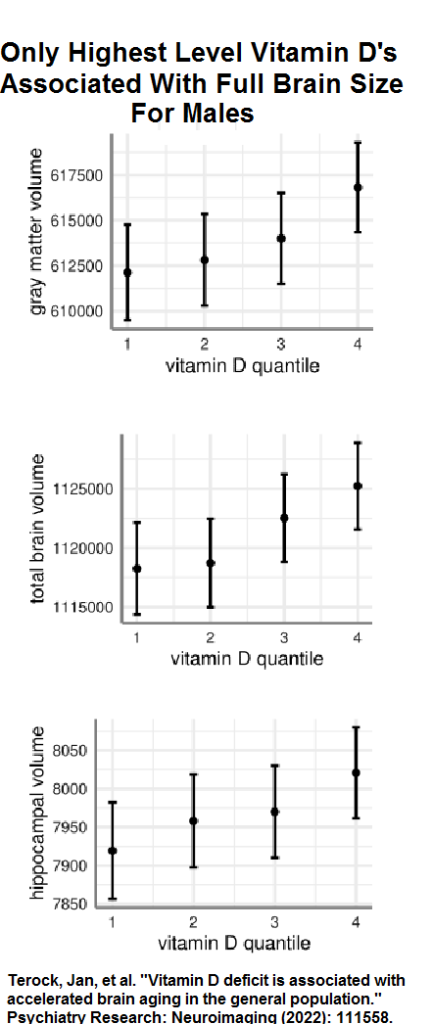Brain Size versus vitamin D levels is a linear relationship pointing out that only high vitamin D levels give full brain size. This confirms prior studies suggesting high doses are needed for health.
Terock, Jan, et al.
Vitamin D deficit is associated with accelerated brain aging in the general population.
Psychiatry Research: Neuroimaging (2022): 111558.
https://www.sciencedirect.com/science/article/abs/pii/S0925492722001172
- 1,865 subjects
vitamin D levels with accelerated aging (Annweiler et al., 2010;
Annweiler, C., Schott, A.-.M., Berrut, G., et al., 2010. Vitamin D and ageing: neurological
issues. Neuropsychobiology 62, 139–150. https://doi.org/10.1159/000318570.
G ́omez-Oliva et al., 2020a)
G ́omez-Oliva, R., Geribaldi-Dold ́an, N., Domínguez-García, S., et al., 2020a. Vitamin D
deficiency as a potential risk factor for accelerated aging, impaired hippocampal
neurogenesis and cognitive decline: a role for Wnt/β-catenin signaling. Aging 12,
13824–13844. https://doi.org/10.18632/aging.103510
mortality (Heath et al., 2019)
Heath, A.K., Kim, I.Y., Hodge, A.M., et al., 2019. Vitamin D status and mortality: a
systematic review of observational studies. Int. J. Environ. Res. Public Health 16,
383. https://doi.org/10.3390/ijerph16030383.
converging evidence points to a role of
vitamin D deficiency in the pathophysiology of various neuropsychiatric
disorders (
Parker et al., 2017
Parker, G.B., Brotchie, H., Graham, R.K., 2017. Vitamin D and depression. J. Affect.
Disord. 208, 56–61. https://doi.org/10.1016/j.jad.2016.08.082
; Terock et al., 2020a, b
Terock, J., Hannemann, A., Janowitz, D., et al., 2020a. Vitamin D levels are associated
with trait resilience but not depression in a general population sample. Brain Behav.
10, e01884.
; Bonk et al., 2020)
Bonk, S., Hertel, J., Zacharias, H.U., et al., 2020. Vitamin D moderates the interaction
between 5-HTTLPR and childhood abuse in depressive disorders. Sci. Rep. 10,
22394. https://doi.org/10.1038/s41598-020-79388-7.
lower vitamin D levels were
repeatedly found to be associated with worse memory performance,
executive dysfunction and overall impaired cognitive functioning in
older adults (
Ku ́zma et al., 2016
Ku ́zma, E., Soni, M., Littlejohns, T.J., et al., 2016. Vitamin D and memory decline: two
population-based prospective studies. J. Alzheimers Dis. 50, 1099–1108. https://doi.
org/10.3233/JAD-150811.
; Annweiler et al., 2018;
Annweiler, C., Doineau, L., Gerigne, L., et al., 2018. Vitamin D and subjective memory
complaint in community-dwelling older adults. Curr. Alzheimer Res. 15, 664–670.
https://doi.org/10.2174/1567205015666180201153735
Sultan et al.,2020).
Sultan, S., Taimuri, U., Basnan, S.A., et al., 2020. Low Vitamin D and its association with
cognitive impairment and dementia. J. Aging Res. 2020, e6097820 https://doi.org/
10.1155/2020/6097820
low vitamin D levels increase the risk of developing mild
cognitive impairment (Ouma et al., 2018) and Alzheimer’s dementia
(Littlejohns et al., 2014; Bivona et al., 2021; Navale et al., 2022). In
contrast, Karakis et al. (2016) reported that vitamin D status was related
to various subclinical parameters of advanced brain aging, but not risk
for dementia in participants from the Framingham heart study (Karakis
et al., 2016).
In a study on very
old participants aged 85 and older, very low, but also very high levels of
vitamin D were associated with cognitive impairment (Granic et al.,
2015).

The quartiles are defined as
Q1 <16.8 ng/ml = <42 nmol/l
Q2=16.8 – 22.6 ng/ml = 42 – 56.5 mmol/l
Q3=22.6–28.9 ng/ml = 56.5 – 72.25 mmol/l
Q4>28.9 ng/ml >72.25 mmol/l